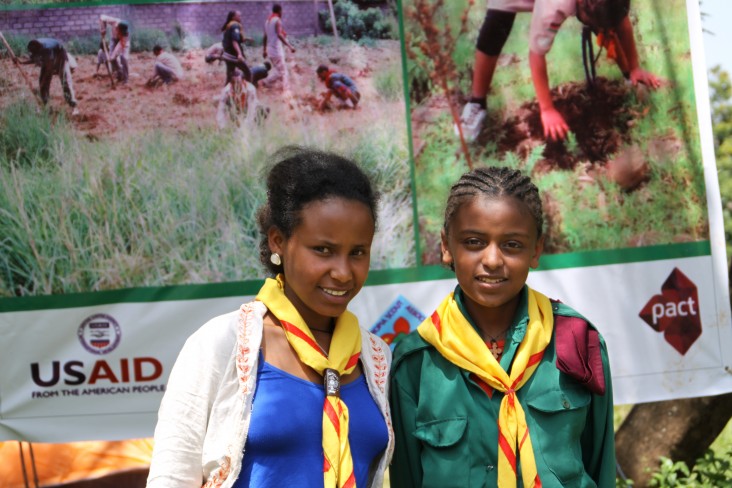
For five days beginning on September 17, 2012, approximately 500 scouts from two city administrations and the nine different regions of Ethiopia gathered at the Defense Engineering College in Debre Zeit for the 4th Ethiopian National Scout Jamboree. This is the first jamboree (an international term used to describe a large gathering of scouts) since 1966!
Scouting in Ethiopia began in 1934, but various political upheavals interrupted the scouting movement until it was reinstituted in 1992. However, the Ethiopian Scouting Association (ESA) was fragmented and did not have the capacity to organize large events like a jamboree. USAID funded the travel and camping expenses of scouts and provided tents, uniforms, backpacks, water bottles, and other scouting equipment that helped make the jamboree a success.
Through its education program, USAID began supporting scouting in 2009 to develop an ethic of civic responsibility in a new generation, and especially among girls, strong self-esteem and leadership. USAID’s Strengthening Civic Education in Primary Schools project, implemented by Pact, is active in 510 primary schools throughout all nine regions and two city administrations of Ethiopia. In each target school, there are 64 scouts and fully 50 percent are girls.
The desire to help others attracted sixteen-year-old Hiwot Zewdu to become a scout. “When you help others, you get happiness and satisfaction.”
In her two years as a scout, she has found numerous ways to make a positive impact in her community by helping others. In 2011, one of Hiwot’s classmates was experiencing some paralysis in his left arm. Hiwot organized a group to raise funds that enabled the boy and his family to travel to the Ethiopian capital of Addis Ababa to receive better medical treatment. Another classmate had to crawl a great distance to and from school because she was paralyzed in her lower body. Hiwot organized a group of people and together, negotiated with the kebele (the smallest administrative unit of Ethiopia similar to a ward) and found a house closer to the school for the girl to live. Additionally, she found a way to provide craft making skills for the girl while also helping to market her crafts. The girl is now continuing school in sixth grade.
Fourteen-year-old Tewobesta Tewoflos is another example of success. She became a scout because scouts do many things to help people and she likes helping people. One of her favorite scouting activities is eating lunch on holidays with children without families. The luncheons, organized by fellow scout Hiwot, currently benefits 79 orphans. Being involved in scouting has also had a positive impact in Tewobesta’s education. She recently scored 100 percent on the national exam to get into high school and attributed this achievement to scouting. “Scouting helped me to be disciplined and obey teachers. It also encourages us to work together.”
Hiwot and Tewobesta now share the scouting message with their community. Their scout troup produces a quarterly newsletter with various messages about scouting, how to study and the benefits of helping others. Hiwot and Tewobesta are just two of the many scouts in Ethiopia who are making a real contribution to creating a better world.
When the USAID project began, there were approximately 20,000 scouts in Ethiopia. Now, there are more than 80,000. In addition to leadership development, USAID assisted ESA to establish a full-fledged secretariat. Echu Teshome is the project coordinator of the ESA. She appreciates the project goal of contributing to capacity development of youth. According to Echu, “scouting encourages volunteerism, something that is really needed in Ethiopia.” Scouting also contributes to emotional, spiritual and physical development.







Comment
Make a general inquiry or suggest an improvement.